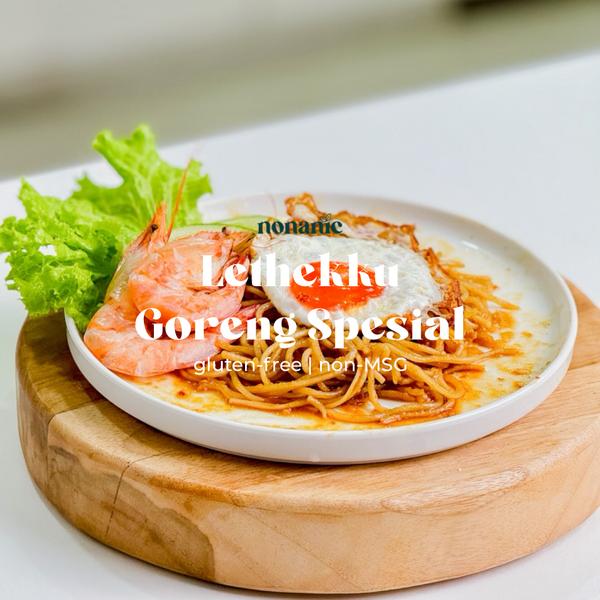
Lethekku Goreng Spesial

"Mie lethek is thin noodles with a brown color originally from Java, Indonesia that are usually made in a traditional way using cassava flour as the main ingredient. At first glance, "mie lethek" looks similar to rice vermicelli. However, "mie lethek" is thicker and has a chewier texture compared to noodles made from wheat."
Hello, BestNic, good evening as we approach the time to break the fast! For BestNic who are fasting, how's your worship going? I hope it's going smoothly. Just let the traffic with your loved one be jammed, not your fasting. Hehhehe #ventinginstead
Oh, how's your nutrient intake and nutrition during the fasting month? Don't forget to always pay attention, BestNic. Because as far as I know, during this fasting month, our food menus tend to be more elaborate than usual. Starting from appetizers, main courses, condiments, to desserts and drinks, everything is carefully prepared. But unfortunately, a complete menu doesn't necessarily mean complete nutrition. That's why all #BestNic needs to pay attention to your sugar levels and food proportions. Also, be careful not to consume too much salt, or you'll end up like you and me, SALTY. 😆
And for those craving savory and salty foods but afraid of feeling guilty, come here!
I have a healthy fried noodle hack recipe and it's super easy to make. This recipe is gluten-free, low in sugar, and also MSG-free. What makes it even more special is that I make the chili sauce homemade! (for those who want the recipe, click here)
SPECIAL FRIED LETHEK
Oh, do you all know what "mie lethek" is?
Let me explain a bit. "mie lethek" is thin noodles with a brown color originally from Java, Indonesia that are usually made in a traditional way using cassava flour as the main ingredient. At first glance, "mie lethek" looks similar to rice vermicelli. However, "mie lethek" is thicker and has a chewier texture compared to noodles made from wheat.
Look at the color, it's naturally brown because it doesn't use whitening agents, coloring, or preservatives. According to me, this color really stimulates the appetite! See, your stomach is rumbling now, isn't it? Hehhee 😆
Oops, sorry for making you crave while fasting. I'm making you drool at this critical time in the evening. It's better if you try making it right away, #BestNic!
Course Main Course
Cuisine Indonesian
Keyword healthy noodle, instant noodle hack, nonMSG recipe, gluten-free noodle
Prep 5 minutes
Cook 10 minutes
Servings 1 serving
Ingredients
Chicken Oil Ingredients:
-
500g chicken skin
-
6 cloves garlic
Main Ingredients:
-
Lethek noodles
-
1 tbsp chicken oil
-
1 tbsp sorghum syrup
-
1 tbsp soy sauce
-
1 tbsp homemade chili sauce
-
¼ tsp salt
-
¼ tsp mushroom seasoning
Instructions
-
Cook chicken skin over low heat until oil is released.
-
Add garlic, cook until fragrant. Turn off the stove.
-
Blend the cooked chicken skin and garlic, then store the chicken oil in a glass jar.
-
Soak lethek noodles in water for 15 minutes, then soak again for 10 minutes in hot water. Drain.
-
In a plate, mix 1 tbsp chicken oil, sorghum syrup, soy sauce, chili sauce, salt, and mushroom seasoning.
-
Add lethek noodles and mix well.
-
Add desired toppings (shrimp, scrambled egg, or vegetables).
Tips
-
Lethek noodles can be replaced with gluten-free noodles, shirataki noodles, or dry rice vermicelli. Follow the cooking instructions on each package.
-
Chicken Onion Oil can last for 1 month at room temperature, preferably stored in sterilized or hot water sterilized glass jars to prolong its shelf life.
-
When cooled, the chicken onion oil may slightly solidify, but it can still be used directly.
-
If soy-free diet is preferred, organic soy sauce can be used as a substitute for coconut aminos, as well as organic sweet soy sauce.
-
Chicken Onion Oil can be stored in the refrigerator for 3 months and in the freezer for 6 months. It is recommended to store it in small containers to prevent frequent opening and closing of the refrigerator.
-
Chicken onion oil can be heated by soaking the glass bottle in hot water. However, chicken onion oil should be discarded if it develops a rancid smell.
Lethekku Goreng Spesial

"Resep ini bebas gluten, rendah gula, dan juga tanpa MSG. Yang menambah spesial adalah, Nona bikin sambalnya homemade!"
Halo, BestNic selamat sore! Buat BestNic yang sedang menjalankan puasa, apa kabar nih? Semoga lancar yaa ibadahnya. Cukup hubungan sama si dia aja yang macet, puasamu jangan. Hehhehe #malahcurhat
Oiya gimana kabar asupan nutrisi dan gizi kamu selama bulan puasa? Jangan lupa diperhatikan selalu lho, BestNic. Karena setau Nona nih, biasanya kalo bulan puasa gini menu makanan kita jadi lebih lengkap dari biasanya. Mulai dari appetizer, main menu, condiment, sampai dessert dan minuman, semua dipersiapkan dengan seksama. Tapi sayangnya, menu lengkap belum tentu kandungan gizinya juga lengkap. Makanya #BestNic semua perlu perhatikan kadar gula dan proporsi makananmu ya. Trus hati-hati juga jangan kebanyakan asupan garam, nanti jadi kaya kamu dan aku, ASING. 😆
Dan buat yang ngidam buka dengan makanan asin gurih tapi takut ngerasa guilty, sini ngumpul!
Nona punya resep mie goreng hack yang sehat dan cara buatnya gampang banget. Resep ini bebas gluten, rendah gula, dan juga tanpa MSG. Yang menambah spesial adalah, Nona bikin sambalnya homemade! (yang mau resepnya, lihat post selanjutnya ya!)
LETHEKKU GORENG SPESIAL
Eh, kalian udah pada tau belum apa itu mie lethek?
Sini Nona jelasin sedikit ya. Mie lethek itu adalah mie tipis berwarna cokelat yang biasanya dibuat masih dengan cara tradisional menggunakan bahan dasar tepung singkong. Sekilas mie lethek ini mirip dengan mie bihun, sih. Tetapi mie lethek ini lebih tebal dan memiliki tektur yang lebih kenyal dibandingkan dengan mie yang terbuat dari gandum.
Liat deh warnanya, emang kecokelatan alami karena tidak menggunakan bahan pemutih, pewarna atau zat pengawet. Menurut Nona sih warnanya ini bener-bener membangkitkan selera makan! Nah tuh, denger deh suara perut kamu jadi keroncongan gitu. BAPER ya? Hehhee 😆
Aduh, maaf ya buat yang lagi puasa. Nona malah bikin ngiler di saat jam kritis sore-sore gini. Mendingan kamu langsung cobain bikin deh, #BestNic !
Menu Makanan Utama
Asal Masakan Indonesia
Kata Kunci mie instant hack, mie bebas gluten, tanpa-MSG, mie goreng sehat, mie lethek, mie rendah gula
Waktu Persiapan 5 menit
Waktu Memasak 10 menit
Porsi 1 porsi
Bahan - Bahan
Bahan minyak ayam:
-
500 gr kulit ayam
-
6 siung bawang putih
Bahan utama:
-
Mie lethek
-
1 sdm minyak ayam
-
1 sdm kecap sorghum
-
1 sdm kecap asin
-
1 sdm saus sambal homemade
-
¼ sdt garam
-
¼ sdt bumbu jamur
Cara Membuat
-
Masak kulit ayam dengan api kecil sampai keluar minyak.
-
Masukkan bawang putih, masak kembali sampai harum. Matikan kompor.
-
Blender kulit ayam dan bawang putih tadi, lalu simpan hasil minyak ayam di dalam toples kaca.
-
Rendam lethek dengan air 15 menit lalu rendam kembali 10 menit menggunakan air panas. Tiriskan.
-
Di dalam piring, campur 1 sdm minyak ayam, kecap sorghum, kecap asin, saus sambal, garam dan jamur.
-
Masukkan lethek dan aduk rata.
-
Tambahkan topping sesuai selera ( udang, telur dadar atau sayur)
Tips
1. Mie lethek dapat diganti dengan mie gluten-free, mie shirataki atau bihun kering, cara memasak ikuti petunjuk kemasan masing-masing.
2. Minyak Ayam Bawang dapat bertahan 1 bulan pada suhu ruang, sebaiknya disimpan ke dalam jar kaca yang sudah disteril atau direbus dengan air panas terlebih dahulu supaya tahan lama.
3. Saat sudah dingin, minyak ayam bawang akan sedikit membeku, namun tetap dapat langsung digunakan.
4. Jika tidak ada diet kedelai, dapat menggunakan kecap asin organik sebagai pengganti coconut aminos, begitupun dengan kecap manis organik.
5. Minyak Ayam Bawang dapat disimpan di dalam kulkas selama 3 bulan & freezer selama 6 bulan. Sebaiknya disimpan ke dalam wadah-wadah kecil agar minyak ayam bawang tidak sering keluar masuk kulkas.
6. Minyak ayam bawang dapat dihangatkan dengan merendam botol kaca ke dalam air panas. Namun minyak ayam bawang sebaiknya dibuang jika sudah berbau tengik.





